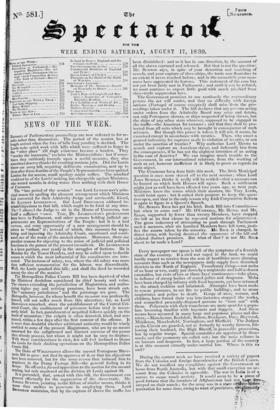Every newspaper one opens is full of the symptoms of
a feverish state of the country. If a civil war raged in the land, we could hardly expect to receive from the seat of hostilities more alarming accounts than such as the newspapers daily supply from disturbed districts in the North of England. Tumultuary risings—not mobs of an hour or two, easily put down by a magistrate anifhalf-a-dozen constables, but riots of two or three days' continuance—take place, in defiance of strong bodies of armed police and dragoons. Mobs have been charged by infantry with fixed bayonets, yet have returned to the attack reckless and infuriated. Attempts have been made to rescue prisoners, to set fire to public buildings, and to stone magistrates and police to death. Gangs of men, women, and children, have forced their way into fitctories, stopped the works, and compelled peaceably-disposed persons to "turn out" with them. Policemen with their truncheons are mere sport fin- a popu- lace becoming familiar with bayonets and daggers. And these scenes have occurred in many large and populous places and dis- tricts,—Manchester, Rochdale, Bolton, Stockport, Bury, Heywood, Middleton, Macclesfield, Nottingham, and Sheffield. The Judges on the Circuit are guarded, not as formerly by worthy farmers, fol- lowing their landlord, the high Sheriff, in peaceable procession, but by regular troops. Special constables are appointed by thou- sands, and the yeomanry are called out ; but the main reliance is on hussars and dragoons. In fact, a large portion of the country is at this moment virtually under martial law. Where is this to end ?


























